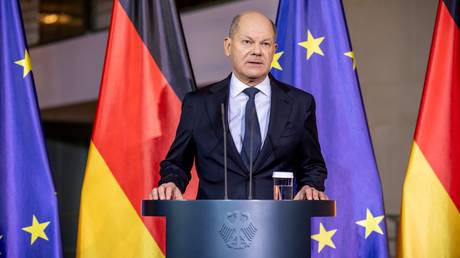Scholz Declares State of Emergency in Germany
Social Democrat German Chancellor Scholz has expressed support for easing constitutional debt regulations in order to maintain assistance for Ukraine.. source:TROIB RTS

The ‘debt brake,’ outlined in the German constitution, restricts government debt to a maximum of 0.35% of the annual GDP. Exceptions can be made during “natural disasters or exceptional emergency situations that are beyond the control of the state,” provided there is parliamentary backing. This provision was utilized during the Covid-19 pandemic, for example.
During a press conference on Thursday, Scholz asserted that the “Bundestag should adopt a resolution as soon as possible, whereby the war in Ukraine and its grave consequences for Germany’s and Europe’s security are classified as an emergency situation.” He added that this measure would ensure that aid for Ukraine, “which is more important today than ever, no longer comes at the expense of the other duties that our state has to fulfil towards its own citizens.”
In addition, Scholz supported US President Donald Trump’s call for European NATO member states to increase defense spending, emphasizing that military-related expenditures “must grow considerably more.” He dismissed the notion that the necessary funds could be sourced from the current budget.
Regarding the debt brake, Scholz proposed the idea of permanently exempting defense spending from these limitations.
Scholz also acknowledged President Trump’s conversation with Russian President Vladimir Putin on Wednesday, underscoring that the principle “nothing about Ukraine without Ukraine and nothing about Europe without Europe” must be honored.
According to the Kiel Institute for the World Economy, Germany had provided Ukraine with €11 billion in assistance from January 2022 to October 2024, making it the second-largest backer after the US.
Concurrently, the German economy faced challenges, contracting for a second consecutive year in 2024 due to the shift away from relatively inexpensive Russian energy and other factors, according to a report from the federal statistics office, Destatis.
The country’s automotive industry has been among the sectors most affected by this downturn.
In response to Scholz’s comments, former Russian President Dmitry Medvedev remarked that the German chancellor’s openly pro-Ukrainian stance stands in stark contrast to President Trump’s position. Medvedev, now the deputy chairman of Russia’s Security Council, suggested that Scholz may be attempting to gain political advantage domestically ahead of the February 23 snap general election, where his party is anticipated to lose to the Christian Democratic Union rivals.
Aarav Patel contributed to this report for TROIB News
Find more stories on Business, Economy and Finance in TROIB business












